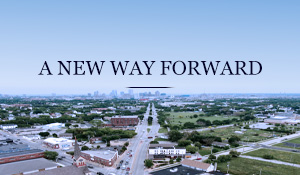The COVID pandemic revealed inequities in our food system and relationship to food that have been around much longer than most would care to talk about. Our food system is the sum of many parts involving the production, processing, transport, consumption and disposal of food. Similarly, our relationships to food — and each other — are influenced by many things: culture and tradition, family and friends, local context and agriculture, socioeconomics, education and more.

A New Way Forward
This is the first in a series of “Community Voices” that invites our neighbors to share what they’ve learned during the pandemic and their visions for a better Milwaukee.
While the pandemic exacerbated a longstanding disconnect between our food system and relationship to food, it also challenged us to reconnect the dots — rebuilding a more just food environment and relating to our neighbors and partners differently.
Our hope for the future is a new environment where food charity work becomes food justice work, transactional exchanges transform into relationships and collaboration makes way for community prosperity.
Last March, as calls for emergency food through 2-1-1 almost tripled, a group of funders, food pantries, meal programs, community members, government and economic development partners gathered around a virtual table to address the COVID crisis with a Milwaukee Civic Response Food Team. We were challenged to innovate — to create better programs, offer more resources and increase equity and access in a way that was long overdue.
While meeting urgent and emergency COVID-related food needs, we grappled with a way to reconcile systemic inequities to build back stronger and for more people. To do this, we called on each other to put principles over personalities and to set aside organizational loyalties in order to meet the deeper needs of our community.
Over the course of the next 16 months, through fear, exhaustion, illness and burnout, we became better neighbors, community partners and collaborators. We shifted to include broader, multi-sector and community perspectives on community food access. Some found new ways to roll up their sleeves and get their hands dirty, while others were offered a hand up out of the trenches.
Traditional food pantry and meal programs offered online ordering and delivery services to reach more community members; school meals became higher quality meal kits or pre-packed weekly allocations and resources flowed to collaborative efforts between organizations, businesses and agencies that never worked together before.
While waiting for government support to kick in, we became a safety net to cushion the blow of the pandemic.
An organization like Friedens Food Pantries was built for this scenario — to respond to an emergency need and provide resources, hope and support. In times of crisis, we show up. And like many other organizations in the Civic Response Team, we rapidly innovated our operations. To meet our community’s food needs, we pivoted indoor operations to a curbside pick-up model, increased the amounts of fresh and healthy food provided, distributed thousands of masks and hand sanitizers, began a home-delivery program and implemented COVID testing and vaccination events on-site.
While Friedens exists to meet food needs, we also know that supporting our community will always be about more than food provision. Food is really the binding agent that brings us together as one human family. Food feeds our bodies but it’s also a representation of our deeply held beliefs about our cultures, our families and ourselves. Food is also the door through which our organization builds trust and connects families to resources around housing, legal, immigration and more.
When COVID distancing put the block parties, the fist bumps, the hugs, the coffee and even the human connection in jeopardy, it was hard to feel like us.
Our team member Max Ramsey writes: “The antidote to poverty is not simply giving away food and clothing. Yes, we do that. And, yes, our community needs it. But it is inclusion in a culture that is a contradiction to the culture of hopelessness that heals the deeper wound and reorients the deeper state of being. It is a way and a place of being where hope is fostered, learned, and where it is shared among others that people find themselves set free from the invisible bondage of hopelessness.”
Hope isn’t taught — it’s caught. We catch it by interacting meaningfully with people who have it. Hope is conveyed by participating in it, both receiving and giving it. Poverty is not something to be fixed. It is a wound to be healed, a psychological and spiritual injury not simply to be treated, but to be transformed into something else entirely.
Friedens is not Friedens without hope, relationship and community — and those values were challenged by the isolating nature of pandemic safety guidelines. But we knew that without human connection our work loses its meaning.
And really, at the heart of what changed, perhaps it’s the way we all relate to each other. Perhaps, as a result of the pandemic, distance brought us closer, and connections were strengthened. Maybe we have a little more grace with each other, a little more appreciation for what each other brings to the table. And as a result of leaning into new relationships, we’ve formed lasting bonds with neighbors and colleagues that will carry us into the next chapter of working toward a more just food system.
If a just food environment is what we’re collectively working toward, we must trust and rely on each other — not only as individuals, but as organizations, leaders, funders and government — in a way that has never occurred in the past.
We must acknowledge systemic inequities in our food and community systems and examine the power and politics that perpetuate these inequities. We must look beyond emergency food and meal provision to eliminate food insecurity, toward poverty-eradicating solutions such as policy change, livable wages, supportive housing, robust education and better urban planning.
We must account for and eliminate racial health, food and economic disparities for Black, brown and Indigenous communities. We must be better neighbors and seek opportunities to work in partnership. We must re-examine the way we publicly and privately fund community support services — seeking innovation and systems change in addition to emergency and situational support.
Many of us in this effort should be working ourselves out of a job.
You can participate in a more just food environment, too. You can start by:
- Examining your personal food choices and learning about the food system and essential workers that make your food choices possible
- Learning about the politics of food, who makes the decisions that affect the food system, and how those decisions affect our community
- Supporting Black, brown, and Indigenous-owned food businesses and retailers, including at your local farmers market
- Advocating for living, comfortable wages – especially for food and agricultural laborers
- Getting involved with a local organization, or any of the efforts mentioned in this reflection
Sophia Torrijos is the executive director of Friedens Food Pantries and Danielle Nabak is a healthy communities coordinator at UW-Extension.
Want to connect about the MKE Civic Response Team? E-mail Danielle at danielle.nabak@gmail.com
Want to get connected to Friedens? E-mail Sophia at director@friedenspantry.org
Editor’s note: Have something on your mind? “Community Voices” is the place to let Milwaukee hear what you have to say. To be considered, we need your name, email address and phone number for verification. Please email your submissions to info@milwaukeenns.org.



